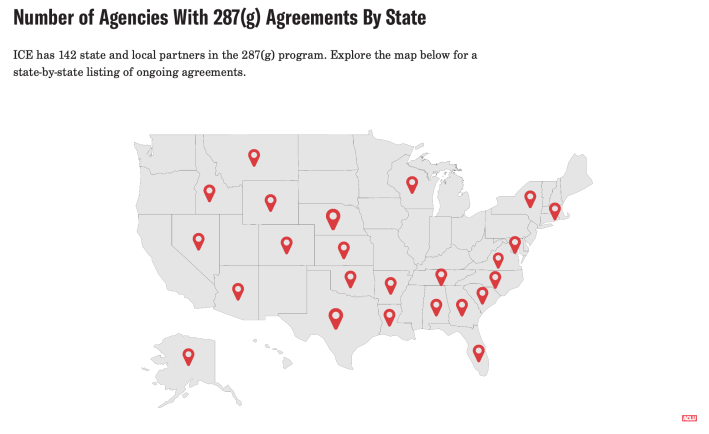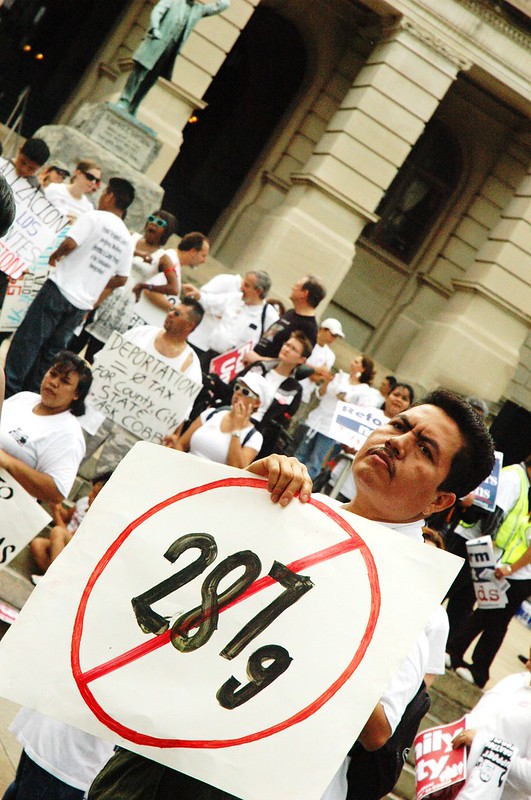President-elect Trump's promise to deport one million people per year will reportedly require state and local traffic enforcement to carry out — and in the process, some advocates fear he could further cloud questions about the role of police in making America's streets safer.
According to multiple outlets, the president-elect and his incoming "border czar," Tom Homan, are again making plans to expand the use of a program known as 287(g), which gives participating jurisdictions special privileges aimed at helping U.S. Immigrations and Customs Enforcement identify, arrest, and detain people who they believe could be subject to deportation.
Deporting immigrants is typically the domain of the federal government — and some "sanctuary" states and cities put up guardrails limiting how much cops can work with immigration authorities when possible deportees are taken into their custody (at least for now.) The more than 100 jurisdictions that participate in the 287(g) program, though, fall at the other end of that spectrum, voluntarily training and deputizing their officers to perform some of the duties of ICE officials directly, like serving warrants on the agency's behalf.
In some cases, 287(g) officers even allowed to screen people they've arrested for other crimes in order to determine their immigration status, take sworn statements about immigration matters, and access federal immigration databases — an arrangement that, according to the American Civil Liberties Union, allows them to "effectively take on the role of federal immigration police."

Defenders of 287(g) argue that these powers are limited, and that police can't exercise them until an immigrant has already been arrested for other crimes. But critics say that in practice, the program dangerously blurs the line between immigration officers and local police, and that the elected sheriffs who make up the overwhelming majority of 287(g) participants — 92 percent of whom the ACLU notes are Republicans — often abuse their newfound power to root out suspected "illegals" from their communities based on the flimsiest of pretexts.
Perhaps the most infamous example of that abuse were the crimes of former Maricopa County Sheriff Joe Arpaio, the Arizona lawman who was convicted of criminal contempt after defying a court order to stop racially profiling and illegally detaining suspected migrants. (Then-President Trump pardoned him in 2021). Experts say even less egregious outcomes from the program, though, can still cause devastating harm.
“One of the issues that comes up [with 287(g)] is that once a local police department enters one of these agreements, sometimes the messaging isn't entirely clear to the officers about what their roles and duties under these agreements are," said Kevin Johnson, a professor of public interest law and Chicano/a studies at the University of California Davis. "The concern is that they might stop people just for thinking they're undocumented, and be overzealous in their immigration enforcement activities from there. ... [The fact is], we have an immigration system in this country that feeds off the criminal justice system, which often relies on traffic stops to bring people into the criminal justice system."

ICE on the road
Because traffic stops are among the most common sites of interaction between police and the public, Johnson says that many of the most troubling instances of 287(g) abuse happen on America's streets and roads.
Many deportations begin with felony road convictions like DUIs, but others start with low-level offenses like "jaywalking," broken tail lights, and hanging air fresheners over rear view mirrors; others arrests on the road aren't recorded as roadway crimes at all, like migrants who are caught carrying improperly registered hunting rifles in their vehicles, or roadside food vendors who are cited for preparing food without the proper permits.
In a 2022 report, the ACLU said that the 287(g) program "emboldens state and local law enforcement officers to racially profile — stopping and arresting people on the pretext of traffic violations or other minor offenses — for the actual purpose of putting them in a pipeline to deportation and separation from their families."
“The concern is that maybe somebody’s driving a little too fast, and they ‘look’ illegal — which probably means they look like working-class Latinos — and a stop occurs that wouldn't have otherwise happened, except for the immigration enforcement involved," added Johnson. "Even if they’ve been arrested for relatively minor things, like driving without registration or with a suspended license or something like that, they could end up getting arrested, being turned over to ICE and end up in the deportation machinery. The worry is that there's going to be meritless stops based on frivolous grounds that result in removals.”
Johnson also worries about the broader public safety impacts of involving more local police in the deportation process — especially when it comes to roadway safety.
If immigrants view police as an extension of ICE, he argues that they'll be less likely to report crimes, provide information that can help cops close cases, or even simply remain on the scene when they hurt someone or themselves. Researchers estimate that when California enacted a law allowing undocumented people to secure driver's licenses, the state reduced the share of crashes that were hit and runs by as much as 10.4 percent — almost certainly getting traffic violence victims more immediate medical care and saving their lives.
As of 2023, all but 19 states and the District of Columbia denied licenses to undocumented immigrants, a policy which also bars them from buying car insurance and receiving the same pre-licensure safety training as other motorists.
“If immigrants think that the police are part of the immigration enforcement machinery, they're not going to want to report crimes or be witnesses at trials for criminal prosecutions," Johnson added. "They're not going to want to have anything to do with the police. … And if immigrants don't work with the police, then we're all less safe.”
'Because they "look" Latino'
Johnson acknowledged the 287(g) program isn't the only component of the "traffic stops to deportation pipeline," which Citylab's Linda Poon detailed in an excellent 2021 article. And he also acknowledges that some street safety advocates might want their local police to be tough on deadly roadway crimes, up to and including collaborating with ICE to deport immigrants who kill, injure, or endanger others behind the wheel.
He argues, though, that programs like 287(g) don't make roads safer, not least by making immigrants who aren't hurting anyone fearful about making contact with police every time they move through their communities. He's worked with both legal and illegal immigrants who are terrified to simply take their children to school or travel to a doctor's office lest they encounter a police officer on the way who might stop them on the thinnest pretext — and possibly, land them in deportation proceedings.
And in a transportation culture that criminalizes the act of crossing the street, punishes poor drivers in car-dependent places for being unable to afford to replace their tail lights, and encourages speeding through common everyday road design, those pretexts are never very hard to find.
“I'm not particularly soft on crime; tragic situations [like] that case in Georgia involving the poor nursing student make me want throw up," Johnson added. "I don't take any of it lightly. ... But I don't think the issue here is whether we should have crime-based removals. I think the issue is: should we really subject every Latino in American society to stops just because they 'look' Latino — and then come up with a crime they committed, or might have committed, to get them out of the country?”






